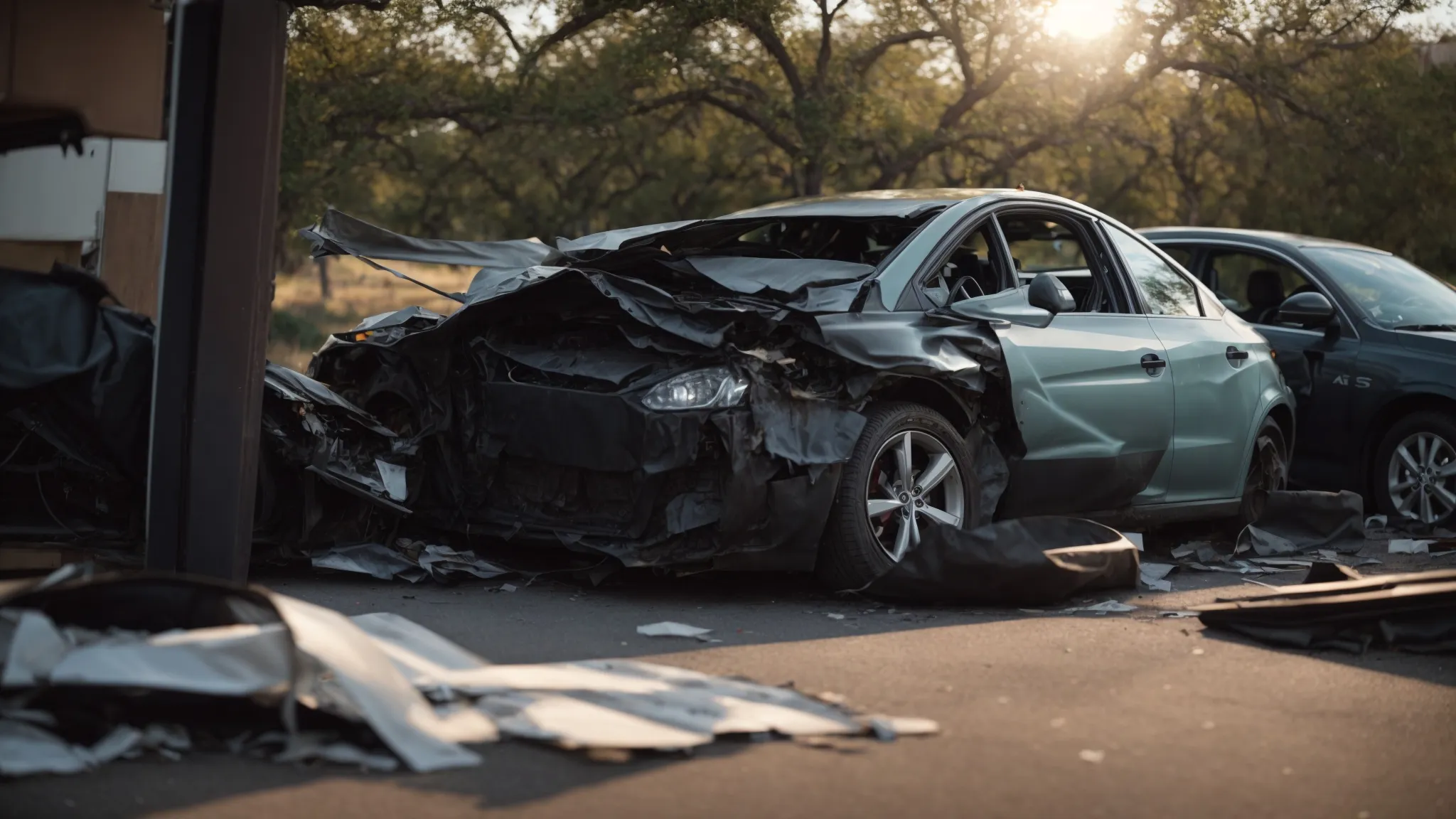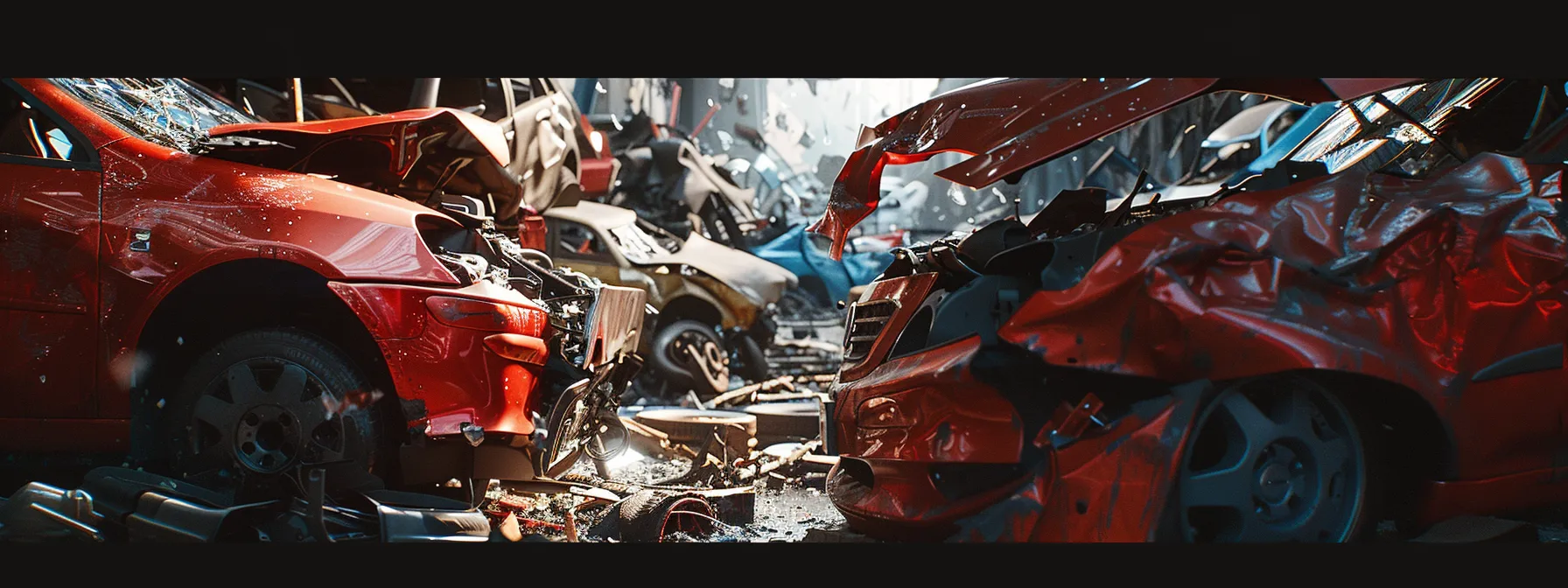Have you ever been left grappling with the aftermath of a car accident, uncertain how to navigate the complex web of compensation laws Texas has in place? You’re not alone. Many accident victims find themselves facing mounting medical bills, the agony of recovery, and the red tape of insurance policies. This blog post will strip away the confusion, offering an incisive look at Texas car accident compensation laws, guiding you through determining fault and liability, and expanding on the types of compensation to which you may be entitled. With Attorney Robert J. Heil’s expertise, you’ll learn how to protect your rights, tackle the claim filing process, and make informed decisions to maximize your compensation for car accident injuries. Whether it’s a minor collision or a distressing hit and run, this article is your first step towards relief and justice in the wake of an accident.
Key Takeaways
- Texas adheres to a modified comparative fault rule for car accident compensation
- A two-year statute of limitations is crucial for filing car accident claims in Texas
- Uninsured and underinsured motorist coverage offers vital protection for Texas drivers
- Documentation and legal representation are key to maximizing car accident claim outcomes
- Timely medical and legal action following an accident are essential for a strong claim
An Overview of Texas Car Accident Compensation Laws

Understanding Texas car accident compensation laws is pivotal for any driver, pedestrian, or property owner facing the aftermath of a collision. This overview will delve into the key elements of Texas car accident laws, clarify the fault system, and map out the legal rights available after an accident. The forthcoming sections will discuss how Texas recognizes fault and the implications for compensation, delineate the statutes governing claims, and examine what constitutes a total loss. Further, the content will elucidate the nuances of ‘slip and fall’ incidents, outlining potential fees and recovery processes. Grounded in practical knowledge, these insights aim to ensure readers are well-informed about their rights and the legal pathways for redress in Texas.
Key Elements of Texas Car Accident Compensation Laws
At the heart of Texas car accident law is the principle of ‘proportionate responsibility,’ which governs how damages are assessed based on fault. For an individual involved in a car accident, understanding the specifics of their insurance policy is essential. Texas law requires all drivers to carry minimum liability insurance to cover costs related to bodily injury and property damage. However, in accidents involving serious injury or significant damage, the minimum coverage may not suffice, opening individuals to additional risk and potential employment disruptions, particularly if a commercial vehicle such as a truck is involved.
When a car accident claim exceeds insurance policy limits or disputed liability occurs, the case may head to trial. In these situations, Texas courts scrutinize each party’s role in the accident to determine compensation. The outcomes can heavily depend on the plaintiff’s ability to demonstrate the other party’s fault. Thus, the intricacies of Texas’ fault determination underscore the importance of adept legal representation to mitigate risk and navigate the complexities of the trial process effectively.
The Fault System in Texas Explained
In Texas, the fault system plays a crucial role in determining liability and compensation following a car crash. The law adheres to a modified comparative fault rule, meaning that an injured party can recover damages only if their portion of responsibility is less than 51%. However, their recoverable compensation will decrease proportionally to their degree of fault. For instance, if an individual is found to be 20% responsible for an accident, their awarded damages will be reduced by that percentage. This facet of Texas law underpins the critical need for substantial evidence and thorough legal strategy when pursuing a claim, particularly when police reports indicate instances of driving under the influence or other violations that could influence fault determination.
Furthermore, the statute of limitations in Texas establishes a definitive timeframe within which a car accident victim must file a claim, typically two years from the date of the incident. Failure to act within this period can result in the loss of the right to seek compensation. Additionally, those with personal injury protection (PIP) coverage can receive immediate benefits for medical expenses and lost wages, without regard to fault. Such coverage can provide essential financial relief while the fair market value of damages is being assessed. It’s imperative for individuals to understand these legal frameworks to navigate their recovery process successfully.
Key Legal Deadlines and Financial Considerations
- Modified comparative fault determines recoverability and reduction of damages based on the injured party’s own fault.
- The statute of limitations mandates a claim to be filed within two years, emphasizing the need for timely action.
- Personal injury protection facilitates immediate support without the necessity of fault assessment.
- Police reports and evidence of infractions such as driving under the influence have significant impact on fault determination.
- Damages are often measured against the fair market value of the property or health condition pre-accident.
Understanding Your Legal Rights After an Accident
After a car accident in Texas, immediately understanding one’s legal rights is indispensable, particularly regarding compensation for actual cash value of damaged property and coverage for medical bills. Rights surrounding personal injury claims extend to specific bodily harm such as shoulder injuries, which can result in prolonged medical treatment and rehabilitation costs. In these cases, seeking a free case evaluation from a seasoned attorney can provide valuable insights into the potential value of a claim and the feasibility of obtaining rightful compensation.
An individual’s swift move towards exercising their legal rights can significantly enhance the accessibility to timely financial aid for mounting medical expenses and property repairs. Acknowledging the urgency of legal action post-accident, Texas law offers a structured approach to seek reparation. Guidance from expert legal counsel ensures that victims navigate the complexities of car accident laws confidently, maximizing the potential for a just settlement.
Determining Fault and Liability in Texas Car Accidents

In Texas, pinpointing fault after a car accident is anchored in a well-defined legal framework. Establishing liability hinges on the principle of comparative negligence, which adjusts compensation based on the injured party’s percentage of fault. Thorough evidence collection, bolstered by police reports and witness testimonies, is critical for substantiating a claim. As injured individuals navigate this intricate process, understanding the role of their policy and the necessity for timely payment request becomes indispensable.
How Fault Is Established Under Texas Law
In Texas, the establishment of fault is based on the principle of contributory negligence, which requires a precise assessment of each party’s responsibility in a car accident. When an ambulance rushes a victim to surgery, detailed records from this emergency response can be pivotal evidence to prove the severity of the injuries and assist in the fault determination process. Accurately attributing fault influences not only immediate cash settlements for medical costs but also long-term compensatory decisions.
Subrogation becomes a critical factor following the establishment of fault when insurance carriers seek to recover funds after a payout. This legal process can involve interactions between the injured party’s insurer and the at-fault party’s carrier. The careful management of subrogation rights can help ensure that the injured party is not financially disadvantaged in the aftermath of the accident:
| Action | Impact on Fault and Liability |
|---|---|
| Evidence Gathering | Provides the groundwork for establishing contributory negligence. |
| Emergency Response Documentation | Serves as a record of injury severity, which can imply fault. |
| Insurance Claims | Initiates the process of financial recovery and subrogation. |
The Role of Comparative Negligence
Texas car accidents involve comparative negligence, which plays a critical role in determining how responsibility is shared among the parties. If an individual behind the wheel is partially responsible for the traffic collision, they will see an adjustment in the compensation they can obtain through a lawsuit or settlement. This adjustment could affect the amount of money they recover for injuries sustained in the accident.
For example, if a driver is found to be 30% at fault in a car accident due to their actions, their ability to recover damages will decrease by that percentage. This mechanism ensures that while individuals can seek restitution for injuries and losses, the amount reflects their contribution to the traffic collision. The precise application of comparative negligence is crucial for victims and defendants alike, guiding the legal discourse in car accident lawsuits:
| Party’s Fault Percentage | Impact on Damage Recovery |
|---|---|
| 20% At Fault | Recovery reduced by 20% |
| 50% At Fault | Recovery reduced by 50% |
| 51% or More At Fault | No recovery possible under Texas law |
Gathering Evidence to Support Your Claim
Gathering substantive evidence is paramount to uphold a claim in the aftermath of a car accident in Texas. A meticulous collection of photographs documenting the scene and the hazards present, alongside statements from witnesses, solidifies one’s case when establishing another party’s liability. Recuperating the market value of damaged property, such as a bicycle in a collision, relies heavily on the quality and relevance of the evidence presented.
Supporting an injury claim with medical documentation is equally critical, as it substantiates the physical harm sustained and aids in formulating a sound judgment for compensation. Clear and detailed medical records link the injury directly to the accident and help quantify the extent of damages sought through legal channels. This objective approach in evidence gathering is designed to serve the requirements of Texas car accident compensation laws and aids in steering victims towards a fair resolution of their claims.
Impact of Police Reports and Witness Statements
In the landscape of Texas car accident claims, police reports serve as a cornerstone document, often swaying the assignment of fault in accidents involving road incidents. When an accident is punctuated by evidence of drunk driving or other traffic violations, police reports not only corroborate the facts but also provide legal leverage for pursuing claims. Witnesses, too, lay the foundation of credibility, where their testimonies can vividly outline the sequence of events leading up to the accident, forming a critical component of the claim.
Once fault has been preliminarily assessed through police documentation and witness accounts, individuals may need to consider therapy or other long-term care, drawing attention to the sustained impact of the accident. This information, when combined with police and eyewitness evidence, forges a compelling argument in settlement or litigation processes. The importance of these elements is underscored in cases where the responsible party engaged in reckless behaviors like drunk driving, demanding a meticulous approach in presenting these facts:
- Police reports validate the circumstances of the accident and highlight any legal infractions.
- Witness statements provide a narrative that can corroborate the victim’s account of the event.
- Recorded infractions such as drunk driving within these documents can influence the apportioning of fault.
- Evidence from these sources is pivotal to substantiating therapy and other post-accident expenses.
Types of Compensation Available to Accident Victims

In the wake of a traffic accident in Texas, victims may pursue a car accident claim to address the financial and emotional fallout. This can encompass recovery of medical expenses and rehabilitation costs, compensation for lost wages and diminished earning capacity, and potential relief for pain and suffering. Additionally, property damage claims are integral for recouping the value of wrecked assets. In severe instances, the court may award punitive damages. The forthcoming sections will discuss each of these categories, arming the reader with vital information for liaising with physicians and navigating the legal landscape of the United States concerning car accidents.
Medical Expenses and Rehabilitation Costs
Following a car accident in Texas, individuals may seek compensation for medical expenses that cover a range of treatments from emergency surgery to ongoing rehabilitation. Courts in Texas acknowledge these costs as a primary component of personal injury claims, recognizing the financial burden that healthcare can impose, especially in cases leading to disability.
The capability to recoup costs related to physical therapy, counseling, and other forms of rehabilitation becomes vital in restoring an accident victim’s quality of life post-traffic incident. It is crucial to document all medical treatments meticulously, as these records serve as tangible evidence in personal injury lawsuits and form the basis for calculating the compensation owed for the injuries sustained.
Lost Wages and Loss of Earning Capacity
In the realm of Texas law, the financial impact of a car accident extends beyond immediate medical costs, affecting a victim’s capacity to work. When injuries force an individual to stray from their professional lane, the law allows for the recovery of lost wages. This includes not only the income lost from missed workdays but also compensation for diminished earning capacity, especially in cases involving long-term effects from medical malpractice or severe injuries.
Testimony from medical experts can be critical in establishing the link between the accident and a victim’s subsequent stress and inability to maintain their prior employment. Texas law provides a framework for plaintiffs to substantiate claims for future earnings affected by the incident. With foresight, the law seeks to ease the financial burden, ensuring victims receive restitution that reflects the true extent of their professional setbacks.
Pain and Suffering Damages
When addressing damages within Texas accident law, pain and suffering emerge as a crucial yet intangible facet of compensation. Victims who endure ailments like whiplash – a common and painful result of vehicular impacts – may seek remuneration for the physical discomfort and mental distress caused by another’s negligence. In these cases, liability insurance may offer solace, but the expertise of a personal injury lawyer is often necessary to navigate the complexities of assigning a monetary value to these non-economic damages.
Calculating pain and suffering damages necessitates a deep understanding of Texas negligence laws and the precedents set by similar cases. Because these damages are subjective, the legal representation’s role becomes pivotal in advocating for fair compensation that reflects the client’s ordeal. The enduring effects of an accident – from perpetual aches to emotional trauma – are weighed meticulously by the courts to ensure the liability insurance of the at-fault party acknowledges the full scope of the victim’s anguish.
Property Damage Claims
In the wake of a collision where distracted driving is identified, Texas law permits victims to file property damage claims against the responsible party’s insurance. A strong car accident case often hinges on the clear demonstration of negligence, ensuring that those affected can recuperate expenses for vehicle repairs or replacement. This recourse provides a semblance of financial stability in an otherwise turbulent time.
For victims confronted with the immediate repercussions of a car accident, engaging with insurance companies to claim property damages demands prompt action. Knowledge of Texas compensation laws is indispensable, empowering individuals to address the repair or total loss of their vehicle swiftly and support their claim with necessary documentation captured during the emergency response to the incident.
Punitive Damages in Severe Cases
In Texas, punitive damages may come into play during a severe traffic crash, especially when evidence points to gross negligence or malicious intent. These damages serve as a financial deterrent, aiming to punish the wrongful actions that led to significant property damage or, in some cases, a wrongful death claim. Law enforcement reports and thorough investigation are key in establishing the egregious nature of the conduct warranting such compensation.
The imposition of punitive damages, though less common than compensatory awards, reflects Texas law’s commitment to justice in instances of extreme carelessness or intentional harm. They are considered in addition to actual damages for medical bills, property repair, or loss, and pain and suffering, further emphasizing the gravity of the offender’s misconduct in a severe car accident scenario.
The Process of Filing a Car Accident Claim in Texas

Navigating the aftermath of an automobile accident in Texas requires a series of crucial steps, starting with immediate actions post-collision, timely reporting to relevant authorities, and interactions with insurance companies. Familiarity with the statute of limitations is essential when considering the timeline for filing a claim. Often, consulting with a lawyer specialized in health-related vehicular incidents proves beneficial, especially when establishing fault is complex. This section breaks down the process, offering insights into each phase and underscoring the importance of working with an adept insurance company to secure just compensation.
Steps to Take Immediately After an Accident
In the immediate wake of motor vehicle accidents, it is critical for those involved to prioritize health care by promptly assessing any injuries sustained by the driver, passengers, or pedestrians. Regardless of apparent severity, medical attention for all parties is paramount, as some health complications related to the incident may not be immediately noticeable. Quick action in securing health care not only provides necessary treatment but also establishes a medical record, which is vital in the later stages of compensation claims.
Following the initial health and safety assessment, securing the accident scene to prevent further damage is essential. This includes moving vehicles out of the flow of traffic if possible and utilizing hazard lights to alert other drivers. Documenting the scene through photographs and gathering contact information from any witnesses can substantially support claims for both personal injury and property damage, offering clarity and evidence that may prove invaluable during the claims process.
Reporting the Accident to the Appropriate Parties
Reporting an auto accident to the appropriate authorities is not only a legal necessity in Texas but also a critical step in the compensation claim process. Pertinent statistics underscore this procedure’s importance, illustrating the prevalence of accidents where alcohol and a lack of attention play significant roles. When brain injuries or significant vehicle damage have occurred, timely reporting establishes an official account of the incident, key in later legal pursuits.
It is essential that victims document the accident scene thoroughly as evidence to support their claim for vehicle damage and any personal injuries. The recorded facts and figures become an authoritative reference, especially when disputing a claim or when there is an argument concerning the roles alcohol or distracted driving might have played in the event. The following table demonstrates the categories and implications of reporting the accident:
| Category | Implication |
|---|---|
| Legal Reporting | Complies with state requirements; starts official documentation. |
| Evidence Gathering | Strengthens compensation claims; includes detail on vehicle damage, alcohol influence. |
| Medical Documentation | Records injuries for legal use; crucial for brain injury assessments. |
Working With Insurance Companies
Engaging with health insurance providers after a car accident in Texas is a pivotal step in the compensation claim process. Guidance from a seasoned attorney can prove invaluable, as insurers often delve into the specifics of comparative negligence, aiming to understand the degree of fault each party bears. It’s essential for claimants to furnish insurance companies with comprehensive evidence, including statements from witnesses and reports from law enforcement officers, to support their case.
When a crash damages a vehicle, insurance companies evaluate the damage and assess repair costs. Claimants must negotiate with insurers, as initial settlement offers often undervalue their losses.
Accurate documentation from the accident scene and medical records can help substantiate their claim, ensuring the compensation reflects the real impact of the accident on their livelihood.
- Present detailed evidence to health insurance and vehicle insurers immediately following an accident.
- Utilize witness testimonies and law enforcement officer reports to reinforce the claim’s legitimacy.
- Ensure all documentation reflects the totality of comparative negligence for a fair assessment.
Statute of Limitations for Filing a Claim
In Texas, the statute of limitations sets a critical deadline for filing car accident claims, including those seeking restitution for medical expenses, pain and suffering, and property damage. Victims of car collisions, including motorcycle accidents, must file a lawsuit within two years of the accident scene occurrence. This time constraint urges claimants to act promptly to avoid forfeiting rightful compensation due to procedural delays.
Understanding the statute of limitations is essential when navigating product liability claims or pursuing damages post-traffic incident. If an injury or defect from the incident comes to light after the initial accident scene evaluation, it’s imperative to seek legal counsel to address these complexities. The time restraint carries significant weight, affecting one’s ability to recover expenses and secure just compensation for pain and suffering resulting from an automotive mishap.
| Type of Accident | Statute of Limitations |
|---|---|
| Car/Motorcycle Accidents | 2 Years from Date of Incident |
| Product Liability Claims | 2 Years from Discovery of Injury |
When to Consult a Legal Professional
After experiencing a car accident injury, a prompt telephone consultation with a legal professional is often a wise step to understand one’s rights and options. Legal experts can offer critical guidance, especially when dealing with complex scenarios such as highway collisions involving multiple vehicles or disputes with a police officer’s report. With knowledge of Texas laws, attorneys can elucidate the path forward on a contingent fee basis, ensuring victims can pursue justice without upfront costs.
Engaging a legal professional early in the claims process can help individuals navigate the nuanced aspects of compensation recovery, from collecting evidence to negotiating with insurance adjustors. Legal counsel becomes particularly invaluable when injuries are severe or when insurance offers appear insufficient, requiring assertive representation to secure fair restitution. The expertise of an attorney in such cases can be the linchpin to achieving a comprehensive settlement for the injuries and losses incurred.
Navigating Insurance Requirements and Policies

For car accident victims in Texas, understanding the nuances of insurance requirements is essential. This section outlines the minimum coverage mandated by state laws, explores the protections provided by uninsured and underinsured motorist coverage, and offers guidance on interacting with insurance adjusters. Car accident victims will also learn strategies for negotiating settlements that adequately compensate for lost wages and suffering. Those seeking knowledgeable assistance should consider the services of Heil Law Firm to navigate these intricate proceedings.
Minimum Insurance Coverage Required in Texas
Texas law mandates that drivers carry a minimum level of auto insurance coverage to ensure financial responsibility in the event of a car accident. Contact Heil Law Firm to navigate these requirements and access personalized service tailored to individuals’ unique situations. The state’s insurance guidelines necessitate coverage for bodily injury liability at a minimum of $30,000 per person and $60,000 per accident, as well as property damage liability of at least $25,000.
For those impacted by an automobile collision, the Heil Law Firm offers comprehensive Personal Injury Services designed to assist in maximizing compensation claims within Texas insurance parameters. Adherence to insurance policies is not merely a legal formality; it is a protective measure that can help cover the significant expenses incurred from medical bills, rehabilitation, and vehicle damage in the aftermath of road mishaps.
Understanding Uninsured and Underinsured Motorist Coverage
In Texas, uninsured and underinsured motorist coverage provides a safeguard for drivers who find themselves in an accident with others who either lack insurance or have insufficient coverage. This form of protection is essential, as it allows for financial recovery from injuries or damages when the at-fault party’s insurance falls short, ensuring victims are not left with insurmountable costs.
Adding uninsured and underinsured motorist coverage to a policy exemplifies prudent foresight, offering peace of mind in unfortunate instances where responsible parties cannot cover the full extent of damages. Such coverage steps in to fill the gap, allowing for compensation that correlates more closely with the actual costs incurred from the car accident:
- Acts as a financial buffer against underinsured or uninsured at-fault drivers.
- Ensures compensation aligns with true damages and injury-related expenses.
- Provides an additional layer of security, beyond state-required minimum coverage.
Dealing With Insurance Adjusters
When engaging with insurance adjusters after a car accident in Texas, the expertise of a competent attorney can be indispensable. Adjusters, tasked with scrutinizing claims, tend to precisely evaluate the severity of damage and scrutinize details to minimize payout. It is crucial for individuals to articulate the impact of the accident clearly and to provide thorough documentation to substantiate their claims, ensuring a fair assessment is achieved.
Insurance adjusters operate with the intent to protect their company’s financial interests, potentially leading to initial settlement offers that undervalue a claimant’s losses. It is beneficial for those affected by a car accident to judiciously navigate these discussions or solicit a seasoned personal injury lawyer who can negotiate on their behalf. This approach can help safeguard the claimant’s interests and facilitate an equitable compensation that genuinely reflects the damages and hardships sustained.
Negotiating a Fair Settlement
Negotiating a fair settlement in Texas after a car accident hinges on an understanding of relevant compensation laws and the ability to effectively communicate the extent of one’s losses to insurance adjusters. Victims must articulate not only the immediate costs incurred but also long-term financial implications like ongoing medical care and loss of earning capacity. Solid evidence, such as medical documents and repair estimates, validates the claim and serves as leverage during negotiations.
It is pivotal for individuals to possess negotiation skills or enlist experienced legal support to ensure their compensation aligns with the true cost of their injuries and vehicle damages. A strategic approach to settlement discussions can lead to more favorable outcomes, as insurers are often inclined to minimize payouts. Individuals should prepare for these negotiations by researching fair compensation amounts and standing firm on the value of their claim:
| Preparation Step | Effect on Settlement Negotiation |
|---|---|
| Gathering of Evidence | Strengthens justification for claim value |
| Estimation of Long-Term Costs | Helps in accounting for future financial impacts |
| Research on Similar Case Settlements | Provides a baseline for fair compensation |
Tips for Protecting Your Rights and Maximizing Compensation

In the intricate process of claiming compensation after a Texas car accident, safeguarding your legal rights and maximizing possible remuneration are pivotal steps. Awareness of common pitfalls to avoid after an accident, meticulously documenting your injuries and damages, understanding the critical role of competent legal representation, and preparing comprehensively for potential legal proceedings can substantially influence your claim’s outcome. We will examine each of these components to equip claimants to navigate Texan car accident compensation laws effectively.
Avoiding Common Mistakes After an Accident
After a car accident, one of the most common mistakes victims can make is neglecting immediate medical evaluation. Prompt medical attention not only aids in injury recovery but also provides vital documentation that strengthens a personal injury claim under Texas law. It’s crucial for individuals to obtain a thorough medical assessment following an accident, even if injuries seem minor, as this establishes a credible link between the incident and subsequent health issues.
Another pivotal error is failing to report the accident to law enforcement or the insurance company in a timely manner. Texas car accident laws dictate a specific window for reporting such incidents, which is key for preserving one’s legal rights and potential compensation claims. Accurate and swift reporting ensures the documentation of vital details, which can be decisive when securing fair compensation:
- Seek medical attention promptly to create an official record of injuries.
- Report the accident to authorities and insurance without delay to ensure accurate documentation.
- Document any property damage and injuries at the scene with photos and notes.
- Do not admit fault or make statements that others could use against you in future proceedings.
- Consult with a Texas car accident attorney early on to guide you through the legal nuances and protect your interests.
Documenting Your Injuries and Damages
Proper documentation of injuries and damages is a critical step in pursuing a car accident claim in Texas. Immediate, detailed records can significantly bolster a case, providing tangible evidence of the impact and aiding in the accurate assessment of compensation due. Such documentation could include medical reports, photographs of injuries, and written estimates for property damage.
Accurate documentation establishes the factual groundwork for the claim and ensures that the claim accounts for all losses, from medical treatment to car repairs. Clear evidence supports the recovery of costs associated with the accident and helps establish the true extent of the damages incurred:
- Gather and organize all medical treatment documentation immediately after the incident.
- Photograph the accident scene and all damages to provide visual proof of the impact.
- Keep a detailed record of related expenses, such as medication and transportation costs.
- Secure witness statements that corroborate the circumstances of the accident.
Importance of Legal Representation
Enlisting the assistance of experienced legal representation is instrumental in navigating Texas car accident compensation laws effectively. A seasoned attorney specializing in personal injury cases can offer invaluable insights into the nuanced legal landscape, ensuring the protection of an individual’s rights and the pursuit of the maximum compensation owed to them. Legal experts adept in this field bring forth strategic negotiation skills and a thorough understanding of the statutes and precedents that govern car accident claims in Texas.
Legal representation becomes particularly crucial when dealing with cases that involve severe injuries or complex liability issues. An attorney’s expertise ensures that all aspects of the claim are professionally addressed, from evidence gathering to engaging with insurance companies. Moreover, with legal counsel, individuals are better equipped to withstand the tactics insurance adjusters may use to undervalue claims, maximizing the likelihood of securing a fair settlement:
- Strategic negotiation skills to maximize compensation.
- Professional handling of evidence and documentation.
- A robust shield against undervaluing tactics by insurance companies.
- Deep understanding of Texas law to navigate complex claims.
Preparing for Potential Legal Proceedings
Entering the legal arena after a car accident in Texas necessitates deliberate preparation. Individuals should compile a comprehensive dossier that includes all relevant evidence: medical records, witness statements, and photographic proof of the accident scene, as these documents form the foundation of a robust legal argument.
- Collect essential documents and meticulously organize them to form a compelling evidence portfolio.
- Analyze medical costs, repair bills, and other accident-related expenses to articulate the demanded compensation accurately.
- Engage a knowledgeable attorney early, whose expertise aligns with the complexities of Texas car accident law.
Arming oneself with a deep understanding of Texas compensation statutes and possible legal outcomes can profoundly influence negotiation with insurers and litigation proceedings. Victims should strive to stay informed about their case’s progression and maintain open lines of communication with their legal representative to ensure the best possible advocacy for their interests.
Conclusion
Grasping Texas car accident compensation laws is critical to effectively advocating for one’s rights and obtaining fair reparation after an accident. Navigating the specifics of comparative negligence and the statute of limitations is paramount to ensuring timely and just recovery of damages. Accurate documentation and legal expertise serve as key allies in maximizing compensation for injuries and losses. Beyond facilitating financial stability, a deep understanding of these laws empowers Texans to confidently address the aftermath of vehicular incidents with the support they rightfully deserve.







